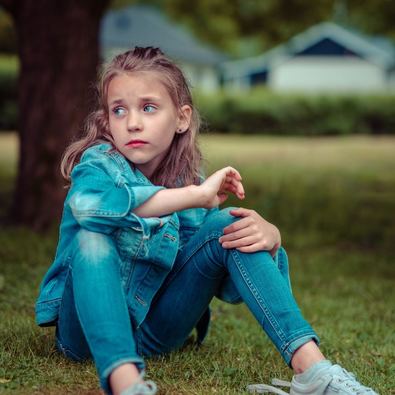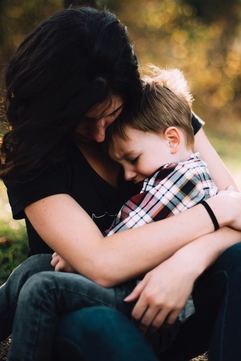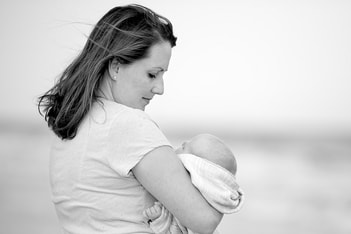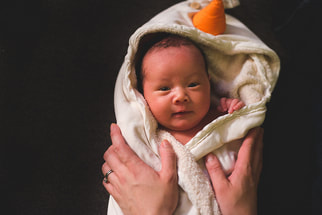 Azine Graff, PsyD When we think of spending time with our children, we probably consider engaging in a scheduled or structured activity. We may even have back-to-back scheduled activities to fill our weekend, which can be exhausting for parent and child alike. But then we’re missing out on a very different and important need when we over-schedule ourselves: The need for time together with no agenda. It can be challenging to shift from being busy all the time to slowing down. It is a lot easier, in theory, to put away our phones, to say “no” to another birthday party, to postpone running errands, or to hold off on feeling productive. As you begin to make room in your schedule for more free time with each other, you are investing in your child and your relationship, and it will pay off now and in the future. This can look like sitting down to play with your child and allowing them to lead the play. The time you spend with them and follow their lead will help them feel empowered in their lives, give them a chance to feel in control over one aspect of their lives, and make them more likely to willfully follow your requests when they need to. These moments that you spend playing, joking and laughing with your child also sends them a message--you are showing them that you love them, value them and enjoy their presence. Know that despite what they may say when they are distressed, they love you, respect you and enjoy being in connection with you. They might just struggle to show it at times, especially if they have no breaks and have a tough time transitioning between the several activities crammed into a day. But small changes can go along way. Continue reading on Mother.ly  Azine Graff, PsyD Anxiety is not always easy to spot in children, and since children are often still learning how to identify their emotions, they are not always able to verbalize what they are experiencing. What can make it even more challenging is that a child’s anxiety can overlap with symptoms of ADD/ADHD, as children with anxiety may also fidget, be forgetful or have difficulty concentrating. It is not uncommon for children with some form of anxiety to be misdiagnosed with ADD/ADHD. Anxiety can also be disguised as irritability or defiance, which makes it all the more confusing for adults to spot. Most of us have long forgotten the pressures that children face and the various scenarios that can spark worries—starting a new sport, taking a test, making a new friend, and answering the teacher’s question when called upon, to name a few. With a variety of factors coming into play, when a child does not know how to manage their emotions, they will likely exhibit their feeling through a behavior. They may act out and they may withdraw. They may look like they are angry, and even make harsh statements. Children with anxiety may make statements that are code for something else. Here are eight common examples: 1. “I don’t want to go to bed” may mean “I am afraid of being alone in my bed.” Continue reading on Mother.ly  Azine Graff, PsyD It can be hard to consider hugging our child when they are acting out. There’s this fear of reinforcing the behavior, and so we have been taught to punish, remove toys, ignore the behavior, and respond with a poker face. But consider a time when you had a rough day, snapped at your partner over something trivial, and all you felt you really needed to melt away the stress was a hug or some comfort. Did you ask for a hug? If so, then what a gift you and your partner have to be vulnerable and communicate so openly. If you didn’t ask, think about why? Maybe what you needed did not even cross your mind. Maybe you were too heated and on the defense to ask. When we are in a heated moment or feeling a surge of our emotions, it makes it much harder to think rationally. When considering our children and how they are developing their prefrontal lobe (the part that does a lot of the planning and decision-making), it then makes sense that they have much more difficulty in expressing themselves calmly when under stress. Continue reading on Mother.ly  Azine Graff, PsyD I got into the field of psychology because I wanted to help others, and this desire to help came from my ability to easily empathize. I never knew just how valuable empathy was as a parent until I started noticing the narration running through my mind as my daughter would cry, whine or scream. I will be the first to admit that when I first became a parent I was not able to consistently use empathy. I was anxious and frustrated that I could not figure out how to help my very tearful (and reportedly colicky) baby during those first few months, and every time I thought I had the parenting routine down, developmental changes made me shift everything. Continue reading on Mother.ly  Azine Graff, PsyD Parenting is the most challenging job you will ever have and can truly be the most rewarding. It is often those things that push us to question our perceptions, thoughts, and our own values that help us grow into stronger and wiser human beings. As humans we are cursed and blessed with the ability to reflect on our thoughts and feelings, unlike animals. As a result, we are often able to make changes for the better and improve our relationships with others and ourselves. In raising our children we have the opportunity to develop new insights and perspectives, if we take the time to reflect on and consciously choose our parenting strategies. Continue reading on Mother.ly |
Categories
All
Disclaimer: Information and resources provided on the internet by Harmony in Parenting - A Psychology Center, Inc. does not constitute psychotherapy, a replacement for a therapeutic relationship, or a substitute for mental health or medical care. If having a psychiatric emergency, please visit your nearest emergency room or call 911. |
NOW OFFERING ONLINE THERAPY
(818) 810-7079 | 16550 Ventura Blvd UNIT 318 Encino, CA 91436
Harmony in Parenting - A Psychology Center, Inc.
16550 Ventura Blvd UNIT 318 Encino, CA 91436
(818) 810-7079
Harmony in Parenting offers therapy for children, parents, and adults residing in Encino, Sherman Oaks, Studio City, Tarzana, and Woodland Hills.
Telehealth and video therapy services are available for residents of California.
© 2024 HARMONY IN PARENTING - A PSYCHOLOGY CENTER, INC. ALL RIGHTS RESERVED.
DISCLAIMER PRIVACY POLICY NOTICE OF PRIVACY PRACTICES TERMS OF SERVICE GOOD FAITH ESTIMATE NOTICE
